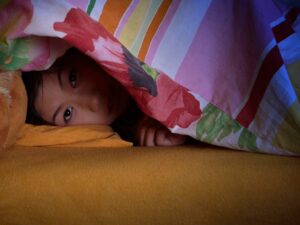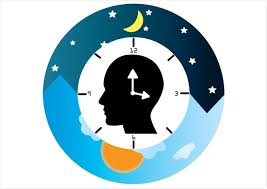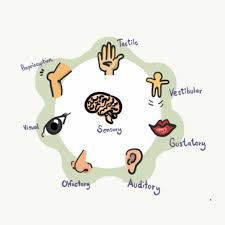
Understanding the Causes and What You Can Do to Help
If bedtime in your house feels more like a chaotic festival than a peaceful wind-down… and your autistic child wont sleep… you’re not alone.
Many parents of autistic children find themselves asking, “Why won’t my child sleep?!” And no, you’re not imagining things- sleep struggles are very common in autistic children; in fact around 80% of autistic children struggle to sleep.
From late-night parties (where only one guest was invited) to super early wakeups (hello, 4 a.m.) it can feel like sleep is the one puzzle no one warned you about.
But here’s the good news: there are reasons behind it. And once we understand those reasons, we can start making gentle changes to help your child (and you!) get the rest you both deserve.
Let’s break it down- with a bit of humour, love, and science; read on or click the links below to jump ahead:
- The Body Clock (Circadian Rythmn)
- Melatonin – The Magical Sleep Hormone
- Anxiety – The Bedtime Party Crasher
- Sensory Stuff: Too much/not enough
- Other Sneaky Sleep Thieves
- How Can You Help?
- How Can Dreamy Bees Help?
The Body Clock That’s… Offbeat (Hello, Circadian Rhythm!)

https://www.news-medical.net/health/Memory-Recall-and-Circadian-Rhythm.aspx
We all have a built-in body clock called the circadian rhythm. It tells us when to wake, when to sleep, and when to crave snacks (okay, maybe that last one’s just us).
In autistic children, this rhythm can be… a little wonky. Think of it like trying to follow a schedule but your watch is set to a different time zone.
Signs your child’s internal clock might be out of sync:
- They’re wide awake at bedtime (and tired in the morning)
- They fall asleep late and wake up super late-or super early
- They seem like night owls in a family of morning birds
Try this:
- Keep wake-up times the same every day, even weekends (we know, it’s tough)
- Let the sunshine in! Morning natural light helps reset the body clock
- Avoid screens too close to bedtime-blue light can mess with melatonin
Melatonin: The Magical Sleep Hormone (That Sometimes Goes Missing)
Ever heard of melatonin? It’s the brain’s way of saying, “Hey, it’s dark, time to get sleepy.” This natural hormone kicks in when the lights go down and helps our bodies drift into dreamland.
But here’s the catch: many autistic children don’t make enough of it-or their bodies don’t release it at the right times.
So, what happens?
Their brains might be shouting, “Let’s play!” at 10 p.m., even though you’re desperately waving the bedtime flag.
Try this:
- Dim the lights in your house about an hour before bed
- Use calming bedtime routines (same steps, same order-predictability is golden)
- Chat with your child’s doctor if you’re wondering about melatonin supplements
Anxiety: The Bedtime Party Crasher
Anxiety has a sneaky way of showing up just when everyone is winding down. For many autistic children, anxiety levels are higher-and bedtime can bring lots of worries.
Maybe your child is nervous about being alone. Or about the dark. Or about that one toy that moved slightly from its usual spot.
How it shows up:
- Trouble falling asleep
- Needing constant reassurance
- Worrying about the next day (or that one time last year when they dropped a crayon)
Try this:
- Visual bedtime schedules help reduce uncertainty
- Comfort items (a favourite teddy, a weighted blanket, a squishy fidget) can ease transitions
- Keep things calm and predictable before bed: low lights, soft sounds, gentle hugs
Sensory Stuff: Too Much, Not Enough, or Just… Wrong
Autistic children often have sensory systems that are wired a bit differently. Some are sensory seekers, others are sensory avoiders-and many are a mix of both.
That means bedtime can feel too loud, too bright, too itchy, or just plain wrong.

Things that might be bothering them:
- Tags in pyjamas (the enemy of peace)
- A hum from the fridge down the hall
- A pillow that’s “too puffy” or “not puffy enough”
- Or they might be missing sensory input:
- Needing deep pressure to calm down
- Wanting movement (hello, trampoline at 8 p.m.)
- Chewing, rocking, spinning-you name it
Try this:
- Create a sensory-friendly bedroom (dark, cool, comfy textures)
- Add white noise, blackout curtains, or a weighted blanket
- Include sensory play or movement in their evening routine-before bed, not after lights-out
Other Sneaky Sleep Thieves
Some other culprits worth checking out:
- Co-occurring conditions like ADHD or tummy troubles
- Sleep associations (like needing a parent to fall asleep)
- Too much screen time late in the day
- Diet sensitivities that could be keeping the body unsettled
A little detective work can go a long way. Try keeping a simple sleep diary for a couple of weeks to spot patterns.
So… How Can You Help?
Here’s the truth: there’s no one-size-fits-all sleep solution. But there are gentle, tailored strategies that can make a big difference.
Start small. Try this:
- Pick one area to focus on-routine, anxiety, sensory, etc.
- Make one change at a time. Give it a week or so to take effect.
- Keep bedtime predictable, calm, and comfy
- Reach out for help-whether it’s a sleep coach, OT, or GP, you don’t have to figure it all out alone.
And Remember:
- Sleep struggles are not your fault.
- You’re not doing anything wrong.
- You’re not alone.
Autistic children often need different support to get good sleep-and you’re doing an amazing job trying to figure out what works for your child. You’re showing up, learning, and being there. That’s huge.
With the right understanding, a few tweaks, and support when you need it, sleep can get better.
Want some hep to get you started? Check out my packages or book a call to chat


